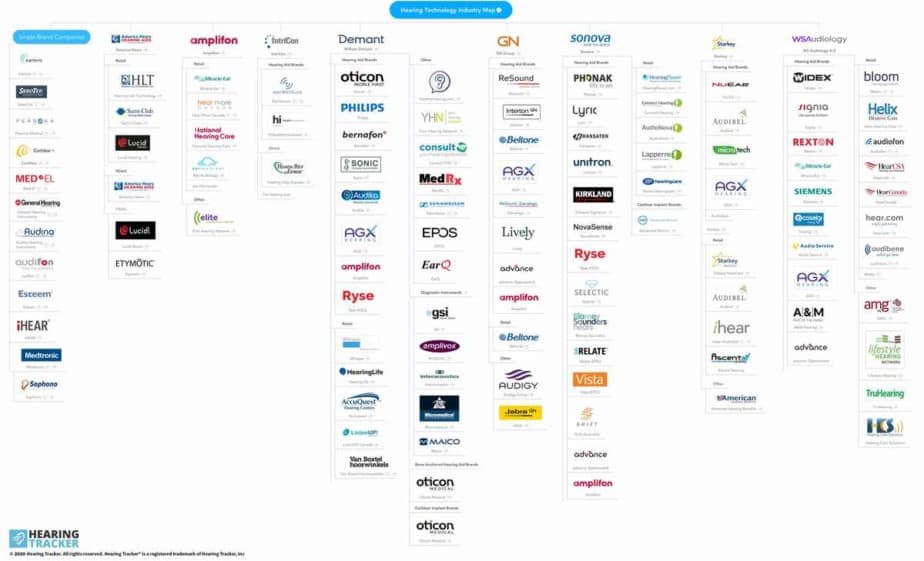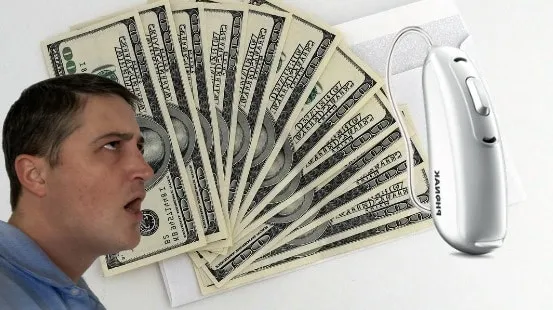According to the Hearing Loss Association of America, almost 30 million adults have hearing loss treatable with hearing aids. Despite that, a very small percentage of adults who need hearing aids have them. This leads to high prices.
So why do hearing aids cost so much?
- Research and development costs are hundreds of millions each year
- A small market (not a lot of people buy hearing aids)
- Lack of competition
- Most insurances don’t cover hearing aids or only cover a small part
- Generally purchased by a professional who has to customize each device
- Warranties and Return Policies
This answer leaves a lot more to explain so let’s get on with that.
You should know that not all hearing aids cost the same amount and not all hearing aids are “one size fits all.” The cost of hearing aids ranges from $300 for simple OTC devices to $3,500 per hearing aid for professionally fit devices.
The more expensive the hearing aid, the more advanced technological features the hearing aid will have. Everybody is different and has different hearing needs and priorities. There are definitely a lot of factors and information to consider when going through the hearing aid buying process and figuring out which hearing aid is “the one” for you.
Research and Design of Hearing Aids
Hearing aid manufacturers spend a lot of money on research and design for hearing aids, and they have to consider that cost when selling hearing aids to hearing care providers. For example, Sonova the parent company of Phonak and Unitron brands spent $195 Million on research in 2021 according to the financial reports.
That money has to come from sales of their products. The company also spend a lot of money on building the devices and having the support of audiologist so the consumers have a brand that they can trust.
Although the actual components to make a hearing aid are not that expensive, the software-based features that make the hearing aid actually function are costly because those features involve research. Each hearing aid company also invests heavily in training audiologists worldwide in how to use the features of hearing aids so the buyers get the most out of them.
Low Market of Hearing Aid Buyers in Relation to Production Costs
One can compare hearing aids to a smartphone and say well smartphones have a lot of technology in them and a high-end smartphone is $1,000 while a high-end hearing aid is $3,500. That is true! However, smartphones are being sold at a much higher rate than hearing aids. in 2021 an estimated 1.5 BILLION cell phones were sold. Only 5 million hearing aids are sold each year in the US.
Hearing aid manufacturers do not lower the cost of hearing aids substantially because, again, it cost them a lot of money to do the research and create the algorithms that have some ability to reduce background noise and listening fatigue. Each manufacturer invests more and more into research each year to compete with one another.
Lack of Competition In the Hearing Aid Market

My friend over at hearing tracker made the above infographic. You can see that there are a lot of companies that sell hearing aids however they come from the same parent companies. There are really 5 major hearing aid companies that have a lot of subsidiaries.
Hearing aids are going “over-the-counter” which will invite more competition into the space but in all reality, these 5 companies may dominate that space as well. It would take a major tech company like Google, Panasonic, or Bose to produce fantastic quality products at much cheaper prices for competition to bring down prices.
Insurances Don’t Pay For Hearing Aids
The reason why people feel that hearing aids are so expensive is that most insurance don’t cover them fully.
In actuality, hearing loss is a very inexpensive disability if you compared it to other medical diagnoses. Think about being a diabetic and how much is spent each and every month on medication ($200-$500). Or imagine if you needed open heart surgery and your hospital stay might be $100,000.
The true difference is that insurance pays in the above-mentioned cases while they don’t pay for hearing aids. This is why people feel that hearing aids are so expensive and cost too much.
Professional Must Customize Hearing Aids

Hearing aids must be customized to each and every ear (yearly). Unlike an iPhone that anyone could pick up and use. For a hearing aid to be effective it must be custom programmed to the exact hearing loss of a person. This requires a professional to test the hearing and learn about the person’s lifestyle so the hearing aid can be set correctly.
Hearing loss also changes over time, so hearing aids must be updated.
Not only does the programming have to be customized but the physical device does as well. Ears come in many shapes and sizes and the hearing aids need to fit correctly into each one. They also live in a moist environment in your ear canal and sometimes need to be repaired.
The Cost of Your Hearing Care Professional

Another consideration pertaining to hearing aid costs is the actual hearing care provider who fits you with your hearing aids. Audiologists are professionals who have doctorate degrees. They will evaluate, diagnose, and treat your hearing loss. Most hearing loss is treated with hearing aids, which means that your audiologist will discuss the best hearing aid options for you and subsequently fit you with hearing aids. Hearing aids are not like glasses.
Unlike glasses, you often have to go in for follow-up visits for programming, fine-tuning, and cleaning of your hearing aids. Usually, the cost of hearing aids is so high because audiologists will include some of their services, as well as the initial programming and fitting of your hearing aid with the cost of the actual hearing aids.
See our article on if you can negotiate hearing aid prices.
This ensures that you are hearing the best and that your hearing aids are functioning optimally. Imagine spending thousands of dollars on a car and then never getting its oil changed. This is exactly why having regular “check-ups” for your hearing aids is essential.
Warranties and Return Policies
Hearing aids break over time and need repairs. Hearing aids are small electronics that are working 14-hour days in a moist environment. Add earwax into the equation and they tend to get clogged up and stop working. This requires trips to the audiologist’s office for cleaning and maintenance. Sometimes the audiologist can’t fix them and they must be sent back to the factory.
Most time when you buy a hearing aid at the audiologist’s office you are paying for future repairs at a bundled price. If you do not want to pay for these future repairs ask if they have ala carte prices.
State laws also require hearing aids to have a return policy. Each time a hearing aid gets returned it costs money due to the time spent on fitting those aids and then the process of returning those hearing aids. When you return a device, you are raising the costs of future purchases of hearing aids for people because the business can’t lose money without going out of business.
If you are interested in purchasing hearing aids, take a look at my recommendation on brands.
Related Questions
Can I just buy one hearing aid? If you have hearing loss in both ears, it is always best to buy two hearing aids. Two ears are always better than one! Given the cost of hearing aids, I know it can be tempting to just buy one hearing aid, but that is not advised. Research shows that when you have hearing loss in both ears and only use a hearing aid in one ear, the unaided ear tends to decline at a much faster rate. In many cases and if you have hearing loss in both ears, it might be better to buy two entry-level hearing aids than one mid-level or premium-level hearing aid.
How long can I wait before I should absolutely buy hearing aids? Most consumers wait at least 7 years before even going to an audiologist for a hearing exam. By the time most people have their hearing evaluated for the first time, they usually have some degree of hearing loss. Treating that hearing loss right away through hearing aids is the best thing to do. The longer you wait to get hearing aids, the worse your hearing loss can get, especially your brain’s ability to process speech.

